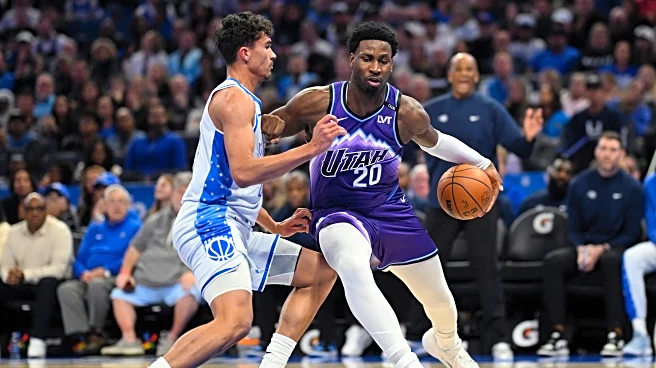What's Happening?
Bari Weiss, a journalist and entrepreneur, has been appointed as the editor-in-chief of CBS News following the acquisition of her startup, The Free Press, by CBS's parent company, Paramount. This move is part of Paramount CEO David Ellison's strategy to revitalize CBS News by integrating Weiss's editorial perspective. The Free Press, known for its heterodox columns and strong support for Israel, will continue to operate independently within Paramount. The acquisition, reportedly valued at $150 million, reflects Ellison's desire to address partisan divisions in media and society. Weiss will report directly to Ellison, bypassing the traditional CBS News hierarchy, while Tom Cibrowski remains president of CBS News.
Why It's Important?
This development is significant as it represents a strategic shift for CBS News, one of the oldest broadcasters in the U.S., aiming to appeal to a broader audience by incorporating diverse editorial viewpoints. Weiss's appointment could influence CBS News's editorial direction, potentially attracting viewers who feel underserved by traditional media outlets. The move also highlights Paramount's commitment to addressing media partisanship and fostering a more balanced news environment. This could impact the media landscape by encouraging other organizations to adopt similar strategies, potentially reshaping public discourse and media consumption patterns.
What's Next?
Weiss is expected to meet with CBS News staff to discuss her vision and plans for the network. Her leadership may lead to changes in CBS News's programming and editorial policies, aiming to attract a politically diverse audience. Paramount's focus on appealing to the 'actual mainstream' of Americans suggests potential shifts in content strategy to emphasize balanced and fact-based reporting. The media industry will likely monitor CBS News's performance under Weiss's leadership to assess the impact of this editorial shift on viewership and public perception.
Beyond the Headlines
The acquisition and Weiss's new role could have broader implications for media ethics and the role of journalism in society. By prioritizing common facts and truths, CBS News under Weiss may contribute to bridging societal divides exacerbated by media polarization. This approach could influence journalistic standards and practices, encouraging a return to foundational journalistic values amid a fragmented media landscape. The success or failure of this strategy may serve as a case study for other media organizations grappling with similar challenges.











